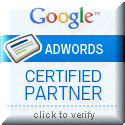
![]() I’m sure there will be many articles written on this topic that will be far more in-depth and perhaps even more up-to-date than what I’m providing here. My objective is to address some of the common questions I receive from clients and prospects, and to provide some interesting distinctions. If you are interested in a side-by-side feature comparison, you will find this article helpful.
I’m sure there will be many articles written on this topic that will be far more in-depth and perhaps even more up-to-date than what I’m providing here. My objective is to address some of the common questions I receive from clients and prospects, and to provide some interesting distinctions. If you are interested in a side-by-side feature comparison, you will find this article helpful.

At the time I’m writing this (3/11), Google and their syndicated partners control about 63% of the search market, Yahoo and Bing along with their partners, about 32%. With that said, I find it is highly dependent on the market (what you’re looking for) and the searching demographic (who is doing the searching). Generally speaking, Google is mostly used by men and business people, whereas Yahoo & Bing attract more consumers and female users. Depending on your product or service, this could be an important factor.
Both Google Ads and adCenter use a quality score, which is based on several factors that they will not completely divulge. This quality score is so significant that it will place an ad from one advertiser above another advertiser who is spending twice the click charge amount! Trying to figure out how the quality score actually works is like trying to hit a moving target when it comes to creating and managing campaigns. However, following a few simple rules, like having tightly themed ad groups, relevant ad copy and implementing basic SEO techniques on your landing pages, can make a noticeable difference in your keyword quality score and how much you pay per click.
As more and more advertisers enter the market, there is naturally increased competition for keywords, which results in higher click charges. But there is another factor, which lies embedded in the search algorithms, that accounts for the fundamental difference between Google Ads and adCenter. It’s the part that matches a user’s search query to the advertiser’s keyword.
The challenge we as advertisers face, is that both algorithms are evolving to force more advertisers to compete for fewer keywords. They basically recognize fewer keywords for what is essentially an infinite number of search queries. Generally speaking, Google gives you more options and provides better tools for managing keywords. This is why you can’t simply copy an Google Ads campaign into adCenter and expect it to perform efficiently.
When I am asked about advertising on Yahoo & Bing verses Google, I almost always say “get it right on Google first, then if you want more traffic, take it to adCenter”.




